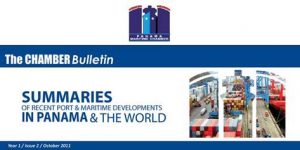
Year 1 / Issue 1 / May 2011
The Chamber Bulletin
INTRODUCTION Welcome to this first international issue of the Chamber Bulletin. The Chamber Bulletin, published by the Maritime Chamber of Panama –Cámara Marítima de Panamá), aims to inform readers of the current shipping affairs in Panama as well as developments with the Panama Canal, the Panama Maritime Authority, the ports and the International Maritime Organization (IMO). The Maritime Chamber of Panama is the voice of the Panamanian Maritime Industry representing the local shipping cluster; from shipyards, ports, service providers, bunkering services, shipping agents, chandlers to, of course, the shipowners with over 8,000 Panamanian registered ships worldwide. The Chamber’s work does not stop there; it also represents its members before the national authorities, the Panama Shipping Registry, the Panama Canal, the Authority of Aquatic resources, and international bodies and agencies, such as the International Labour Organization (ILO). Every issue will bring you an interview with a prominent Panamanian shipping figure and will give you details of our local activities, as well. Needless to say, if you are in the vicinity, drop in for coffee –we pride ourselves to have one of the best coffees around!
International Shipping News |
International Members are now welcome to join the Panama Maritime Chamber
This year the Panama Chamber is launching a massive international campaign to offer the opportunity for international companies and shipowners to apply for membership.
Benefits include receiving support on multiple business issues, from representation to regulation affecting the industry – to a whole spectrum of national shipping issues, since the Chamber is the voice of the Panama Shipping Industry.
With Panama’s ratification of the Maritime Labour Convention (MLC), the Chamber participates as an active member of the Tripartite Commission that discusses the Convention implementation in every country and at the General Assembly at the ILO headquarters in Geneva. With this new responsibility of representing the Registry’s shipowners, the Chamber has created a special international programme to allow the new International Members to join the Panama Chamber.
As an organization that traces its origins back to the very beginning of the Panama Canal operation, almost 100 years ago, the Panama Maritime Chamber has been able to witness the growth of the maritime ancillary services industry and the expansion of the services that maritime lawyers and shipping agencies offer the shipping industry worldwide.
Traditionally the Maritime Chamber has been a national association serving the local maritime cluster, however the role has somehow evolved to become a listening post, a think-tank, a forum that ensures the correct legal, regulatory and procedural climate does exist, so that businesses may continue to develop and prosper.
For more information, please write to This e-mail address is being protected from spambots. You need JavaScript enabled to view it.
Navios CEO Angeliki Frangou receives double distinction during Panama trip.
Navios Holdings Chairman and Chief Executive Officer Angeliki Frangou received International Membership Certificate number 0001 from Julio de La Lastra, the President of the Chamber and became the first ever International Member, and founder of this new category.
|
|
Panama reaches the WHITE List in the Paris MoU
Panama shipping registry, already in the white list of the Tokyo MoU, now scores a second goal by joining the desired and prestigious White List of the Paris MoU. The 2010 Paris MoU report will be published on July 2011. This Regional Port State Control was initiated in 1982 with 14 European countries agreed to co-ordinate their port State inspection effort under a voluntary agreement known as the Paris Memorandum of Understanding on Port State Control (Paris MoU). The new inspection regime (NIR) was introduced last January to give full coverage of visiting ships and a more risk-based method of ship selection resulting in a more effective use of resources. It will also strengthen current banning measures and the training for inspectors. The risk based targeting mechanism will reward quality shipping with a reduced inspection burden and concentrate efforts on high-risk ships. The NIR makes use of company performance and the Voluntary IMO Member State Audit Scheme (VIMSAS) for identifying the risk profile of ships together with the performance of the flag State and the recognised organisation. The inspection history of the ship as well as the ship’s age and ship type will influence the targeting. Since 2011 inspection reports are recorded on a central database called THETIS hosted by EMSA in Lisbon, Portugal. Inspection results, a list of banned ships and an overview of current detentions can be viewed on the Paris MoU public website. The Paris MoU now consists of 27 participating maritime Administrations and covers the waters of the European coastal States and the North Atlantic basin from North America to Europe, recently Montenegro has been accepted as observer. The Paris MoU Secretariat also achieved the ISO9001 certification in March 2011. The Paris MoU’s Committee has adopted the 2010 Annual report which will be published in June 2011; the Committee has also agreed to exchange PSC data with IMO, to be used in the Global Integrated Shipping Information System, and to publish the new coding system for deficiencies on the Paris MoU web site. This is good news for Panama and the thousands of Panamanian registered ships reaching the European ports every year. Source: www.parismou.org
Panama Maritime Authority (AMP) NEWS |
New Merchant Marine Circulars (MMC) recently published
The Panama Maritime Authority publishes from time to time new Circulars for ship-owners, ship managers and crew. It is important that a set of the circulars are placed on board every Panamanian ship if the vessel does not have Internet service on board. To download a set of circulars please visit www.segumar.com MMC 218 – Electronic Charts and Publications in regards to the Carriage Requirements and Crew Training on board Panama Flagged vessels. http://www.segumar.com/HTML%20Merchant%20Marine%20Circulars/218.pdf MMC 219 – Payments to Segumar – to ensure consolidated payments are allocated and services are provided efficiently http://www.segumar.com/HTML%20Merchant%20Marine%20Circulars/219.pdf MMC 220 – Inclusion of Panama as Non-contracting Cooperating Member of the Western and Central Pacific Fisheries Commission (WCPFC) http://www.segumar.com/HTML%20Merchant%20Marine%20Circulars/220.pdf MMC 221 – this merchant marine circular supersedes Circular number 173 and provides the new guidelines adopted by the Panama Maritime Authority, regarding the Occasional Inspection on board Panamanian flagged vessels based on the decreased of detentions within the Paris MOU. http://www.segumar.com/HTML%20Merchant%20Marine%20Circulars/221.pdf MMC 222 – this merchant marine circular recommends visiting the website regularly to ensure new MMC are downloaded and read as they can be important for traffic, navigation or procedures. http://www.segumar.com/HTML%20Merchant%20Marine%20Circulars/222.pdfPanama’s Latest Statistics on Cargo
The Maritime Authority of Panama publishes cargo statistics on bunkering and cruise ship industry as well as container and vehicle movement for the last three years in a row. Analysing these numbers, we may produce a clearer picture of the ups and downs of the maritime industry as a whole and what the tendencies for the near future are. These numbers, however, might change when the final statistics for the year are presented. Bunkering: During the first two months of the year 2011, the number of ships grew from 625 ships in the year 2010 to 635 ships, indicating an increase of a 26.10%. This is a small recovery from the same two months of the year 2009 when we had 691 ships and we saw a decrease in numbers to 635 ships in 2010. Container Movement: Includes import and export and transhipment. During January and February of 2009, there were 691,087 TEU’s. During the same period in 2010, the movement increased to 740,518 TEU’s, or 7.15 – and in 2011 the amount increased again to 1,002,211TEU’s, or 35.34%. Cruise Passengers: The Cruise industry crisis has affected Panama directly, as we can see in the numbers for the year 2011, which have decreased slightly, but could change for the better by end of the year. In the year 2009, there were 182,935 passengers in comparison with 219,704 passengers in 2010 – an increase of 20.10%. However, for the year 2011, the number of passengers has decreased to 190,287 passengers, or a decrease of 13,39%. Vehicles: The numbers show a rapid increase on the movement of vehicles in the year 2011, compared with previous years. In 2009 there were 19,795 vehicle movements, whilst in 2010 the amount decreased to 17,973. However, for the first two months of 2011, the number boosted to a staggering 31,432, or a 74.88% increase from the year 2010. Source: AMP.| Panama Canal Authority News |
Panama Canal Authority Awarded for Its Ethical Leadership and Sustainable Business Practices
The Panama Canal Authority (ACP) has been recognized by the Ethisphere Institute as one of the 2011 World’s Most Ethical Companies.
In times when being green and ecological is part of a good sustainable business operation, to received an international recognition for its innovative work and ethical business practices, shows how much efforts and resources the Panama Canal Authority has been investing in ensure sustainability.
According to the Ethisphere Institute, the ACP secured a spot on the list from a record number of nominations by “going the extra mile and implementing upright business practices and initiatives that are instrumental to the company’s success, benefit the community, and raise the bar for ethical standards within the industry.”
The research-based Ethisphere Institute is a leading international think-tank dedicated to the creation, advancement and sharing of best practices in business ethics, corporate social responsibility, anti-corruption and sustainability.
Every year the world’s most ethical companies ranging in different categories going from apparel to aerospace, to Food and Beverages are published by the institute. The Panama Canal earned the award under the Transportation and Logistics category; as well as the East Japan Railway Company and the NYKK from Japan and UPS from the USA.
Source: ACP & Ethisphere Institute.
A new Bridge over the Panama Canal
The Panama Canal Authority, in charge of managing, operating and maintaining the Canal, received in May of this year six proposals from around the world for the design of the first-ever bridge on the Atlantic side of the waterway.
With the expansion of the canal and only two bridges crossing the canal on the Pacific side, the Bridge of the Americas and the Centennial Bridge, the Atlantic side was in need of a Bridge.
The new bridge will be made of braced concrete and will be near the Gatún Locks, spanning the west and east sides of the city of Colon.
The consortium with the lowest bid presented was the China Communications Construction Company / Louis Berger Group with a total cost of USD 4,662,352. The Canal authority is evaluating if this proposal meets all project needs before awarding the contract.
Source: www.pancanal.com| Panama Maritime Chamber News |
Arbitration in Panamá, soon to be a reality
The Maritime Chamber and the Panamanian Maritime Law Association (APADEMAR) have joined efforts to accelerate the implementation of the Panamanian Maritime Conciliation, Mediation and Arbitration Centre, CECOMAP. Their aim is to have the centre operating before the end of the year, ready to serve the region with new opportunities to settle any business differences within the port and maritime industry without having to go to court. The preliminary meetings are taking place and a working group has been established to ensure this project sees light very soon. For more information please send an email to This e-mail address is being protected from spambots. You need JavaScript enabled to view it.
 |
Chamber participation in Executive Leadership Programme at the Panama Canal
The entire Board of Directors of the Maritime Chamber was invited by the Panama Canal’s Executive Leadership Programme to exchange views on the Chamber’s projects and the very visible role that has undertaken the Chamber as representative of the maritime cluster of Panama. Julio de La Lastra, President of the Maritime Chamber and General Manager of MOL in Panamá made a presentation to the group and the Board Members were able to sit and talk informally with the Canal executives. During his intervention, de La Lastra had the opportunity to present the mission and objectives of the Maritime Chamber as well as the projects and concerns of the membership as it pertains to issues affecting industry worldwide.
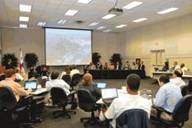 |
Caribbean Regional Conference
Barbados was the stage for the last Caribbean Regional Conference and Alex Orillac, one of the Chamber Vice-presidents attended and made a presentation about the advantages to use the Panama Canal route versus the Antarctic Route. Mr. Orillac was also able to present the benefits to the region of the Canal expansion, as well as the challenges and opportunities that this expansion could bring to the Caribbean maritime industry.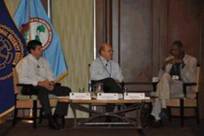
Shipping Agent’s Committee Report
Panama represented at the National Associations of Shipping Agents’ Meeting
Ernesto Mock, the President of the Agent’s Committee, represented the Chamber at the 2011 Annual General Meeting of the Inter-American Chamber of National Associations of Shipping Agents (CIANAM), held in Buenos Aires, Argentina. The most important discussions were on the concept of “Paperless Port”, as well as the initiative to introduce a “single window” for the users of Customs and Excise government’s departments to improve service level, information and efficiency. Another important matter discussed was how to measure the impact of the carbon footprint on the countries’ logistic industries.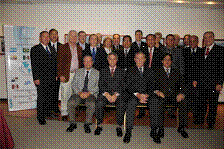
International Relations Committee Report
Cuban Chamber of Commerce visits Panama Maritime Chamber
Mrs. Estrella Madrigal, Cuba’s President of the Chamber of Commerce, along with other members of the Chamber and diplomatic representatives stationed in Panama, visited the Chamber and met with Directors to discuss business opportunities between both countries and the interest for both Chambers to sign an Memorandum of Agreement to develop projects and exchange information. Mrs. Madrigal also invited the Chamber to participate in a series of meetings that would take place soon in Cuba between representatives of the Panama Free Zone and the Cuban Chamber.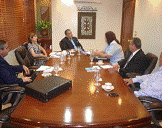
ZAILA introduces their logistic platform from Gijon Port in Spain to Panama
Executives from the Asturias’s Logistic and Industrial activities Area (ZAILA) visited the Chamber and met with several directors in order to expand information on their services and activities and their particular interest in Panama and the maritime ancillary services. The ZAILA representatives are very interested in signing agreements with the Chamber in order to explore new business opportunities in Panama and in Asturias.
Fishing Committee Report
Meeting the Panamanian Authority of the Aquatic Resources (ARAP)
The Maritime Chamber of Panama met with Engineer Giovani Lauri Carreti, General Administrator of the Panamanian Authority of Aquatic Resources (ARAP) in order to re-start working meetings for the revision of the international fishing Licences for Panamanian registered vessels of international service. International Members are invited to contact this office to voice their concern, suggestions and recommendations for the Chamber to discuss the matter with the ARAP. A new Working Group has been formed with representatives from the Panama Maritime Authority, the ARAP, the Maritime Law Association (APADEMAR) and the Maritime Chamber.Shipping Lines Meeting
Recently, top executives and representatives of the International Shipping Lines with offices and representatives in Panama met at the Chamber’s offices to discuss about transportation issues from the ports and from the Colon Free Zone. Specifically, the executives met to address several labour problems they were facing and that had a negative impact on the efficiency of operations.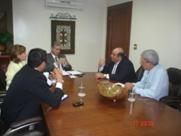 |
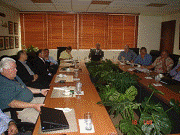 |
Port Authority of A Coruña signs agreements with the Maritime Authority and the Panama Maritime Chambers on their visit to Panama
Two new interagency cooperation agreements were signed by the Galician Port Authority of A Coruña’s representatives during their visit to Panama in May 2011. The first agreement was signed by Roberto Linares, the Administrator of the Panama Maritime Authority with the Administrative Unit of Reverted Properties and the Galician Port Authority of A Coruña in Spain. The second agreement was signed with the Maritime Chamber of Panama. The Cooperation agreement will encourage developing projects and programmes on trading, ports and maritime policies together with ecological and environmental projects to promote the innovation and investigation.
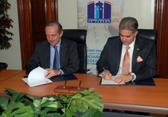 |
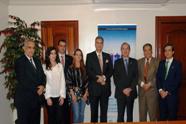 |
|
|
|||||||||||||||||||||||||
| IMO Technical News |
Panama hosts Regional Seminar on STCW amendments for IMO
A Latin-American Regional Seminar for the Maritime Administrations and the Maritime Training Centres organised by IMO was held in Panama during 11 to 15 April for the familiarisation with the adoption of the Manila Amendments to the STCW Convention and Code. The seminar lasted 40 hours and was attended by twenty countries of the region. The facilitators were Capt. Ashok Mahapatra, Head, Maritime Training and Human Element Section, Maritime Safety Division, IMO; Ms. Mayte Medina , US Coast Guard’s Marine Personnel and Qualifications Division Chief, and Eng. Arsenio Domínguez, Technical Adviser of Panama Mission to IMO. The Manila Amendments were adopted in June 2010 during an IMO Diplomatic Conference, agreeing by consensus, a series of new provisions which will apply from 1 January 2012. The most important new provisions are: Improved measures to prevent fraudulent practices associated with certificates of competency and strengthen the evaluation process (monitoring of Parties’ compliance with the Convention); Revised requirements on hours of work and rest and new requirements for the prevention of drug and alcohol abuse, as well as updated standards relating to medical fitness standards for seafarers; New certification requirements for able seafarers; New requirements relating to training in modern technology such as electronic charts and information systems (ECDIS); New requirements for marine environment awareness training and training in leadership and teamwork; New training and certification requirements for electro-technical officers; Updating of competence requirements for personnel serving on board all types of tankers, including new requirements for personnel serving on liquefied gas tankers; New requirements for security training, as well as provisions to ensure that seafarers are properly trained to cope if their ship comes under attack by pirates; Introduction of modern training methodology including distance learning and web-based learning; New training guidance for personnel serving on board ships operating in polar waters; and New training guidance for personnel operating Dynamic Positioning Systems. Source: AMP, IMO.IMO Approves Interim Guidance on Private Armed Security Guards on Ships
IMO’s Maritime Safety Committee (MSC) has announced approval of an MSC Circular on Interim guidance to shipowners, ship operators, and shipmasters on the use of privately contracted armed security personnel on board ships transiting the high-risk piracy area off the coast of Somalia and in the Gulf of Aden and the wider Indian Ocean. The guides are aimed at addressing the complex issue of the employment of private, armed security on board ships. Flag State jurisdiction and any laws and regulations imposed by the flag State concerning the use of private security companies apply to their vessels. Port and coastal States’ laws may also apply to such vessels. The use of privately contracted armed security personnel (PCASP) should not be considered as an alternative to the Best Management Practices to Deter Piracy off the Coast of Somalia and in the Arabian Sea area (BMP) and other protective measures. Placing armed guards on board as a means to secure and protect the vessel and its crew should only be considered after a risk assessment has been carried out. It is also important to involve the Master in the decision making process. The guidance includes sections on risk assessment, selection criteria, insurance cover, command and control, management and use of weapons and ammunition at all times when on board and rules for the use of force as agreed between the shipowner, the private maritime security company and the Master. The interim recommendations for flag States recommend that flag States should have in place a policy on whether or not the use of PCASP will be authorized and, if so, under which conditions. A Flag State should take into account the possible escalation of violence which could result from the use of firearms and carriage of armed personnel on board ships when deciding on its policy. The recommendations are not intended to endorse or institutionalize the use of PCASP and do not address all the legal issues that might be associated with their use onboard ships. A Working Group on Maritime Security and Piracy will meet in the week commencing 12 September 2011, to develop recommendations to Governments (flag, port and coastal States) on the use of PCASP; review the interim guidance to shipowners, ship operators and shipmasters on the use of PCASP for any consequential amendments; agree an MSC circular for the promulgation of the recommendations to Governments on the use of PCASP; if necessary, agree a revised MSC circular on Guidance to shipowners, ship operators and shipmasters on the use of PCASP; and identify any necessary consequential amendments to the Recommendations to Governments for preventing and suppressing piracy and armed robbery against ships (MSC.1/Circ.1333) and the Guidance to shipowners and ship operators, shipmasters and crews on preventing and suppressing acts of piracy and armed robbery against ships (MSC.1/Circ.1334). The MSC also adopted an MSC resolution on Implementation of Best Management Practice guidance, which strongly urges all parties concerned to take action to ensure better implementation of these important measures, recognising the urgent need for merchant shipping to take every possible measure to protect itself from pirate attack and that effective self-protection is the key to avoiding, evading and deterring pirate attacks. The resolution strongly urges all those concerned to take action to ensure that as a minimum and as recommended in the Best Management Practices: ships’ masters receive updated information before and during sailing through the defined High Risk Area; ships register with the Maritime Security Centre Horn of Africa and report to United Kingdom Maritime Trade Operations (UKMTO) Dubai; and ships effectively implement all recommended preventive, evasive and defensive measures. The MSC also agreed Guidelines to assist in the investigation of the crimes of piracy and armed robbery against ships, which are intended to be used in conjunction with resolution A.1025(26) Code of Practice for the Investigation of the Crimes of Piracy and Armed Robbery against Ships. The guidelines are intended to assist an investigator to collect evidence, including forensic evidence, to support the submission of written reports which may assist in the subsequent identification, arrest and prosecution of the pirates that held the vessel and crew captive. Formats for crew statements and logging of evidence are included, as well as guidelines on recovery and packaging of exhibits such as blood, clothing and weapons. The number of acts of piracy and armed robbery against ships reported to the Organization and which occurred in 2010 was 489, against 406 during the previous year, an increase of 20.4% from the figure for 2009. In the first four months of 2011, 214 incidents were reported to the Organization. Source: IMO
SPECIAL ANNOUNCEMENT |
The Chamber publishes a briefing paper called the Chamber Bulletin
As described in the Introduction, the Chamber Bulletin aims at informing our readers, particularly our international Members, about current shipping affairs, as well as developments in the Panama Canal, the Panama Maritime Authority, the ports, ancillary services industry and the IMO.
The Chamber Bulletin will carry advertisement from our Members, local as well as international, in the form of banners. These may be contracted for a very low fee, which will help the Chamber cover the editorial expenses.


